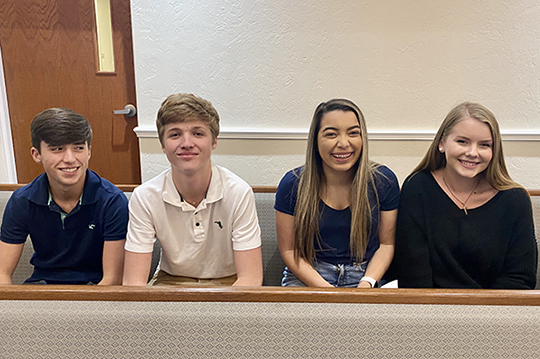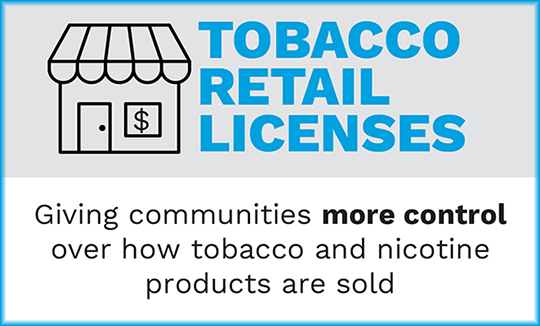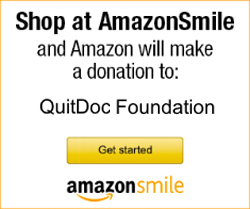News and Events
Visible and Cheap, in the Retail Environment, is Where Tobacco Enters Our Community
May 26, 2020
The tobacco industry spends the vast majority of their marketing money in the retail environment – over $1 million/hour to promote their products, in which, most of their marketing efforts are aimed directly to our kids.
Essentially, the tobacco industry is buying shelf space to keep tobacco visible and offering price discounts to keep tobacco cheap. These companies are no fool, what they are really “buying” is youth who initiate - adults who can’t quit!

SWAT Students presented on point-of-sale advertising and local tobacco retail licensing at the Lake Placid City Council Meeting in March.
(From L to R: Hagen John, Austin Coxe, Mia Santana and Hannah Minshew)
In efforts to combat these marketing tactics, the Tobacco Free Partnership of Highlands County has been elbow deep in the retail realm of the tobacco industry for the past few years. During the 2016 – 2017 fiscal year, adult TFP members, along with the help of Highlands County SWAT Youth, conducted over 100 point of sale (POS) store audits, nearly every licensed tobacco retailer in Highlands County.
In short, several key points included,
- 100% of tobacco retailers sell flavored cigarillos, 80% sell cigarillos in single packs, and 69% of retailers offered price promotions on cigarillos.
- 48.8% of stores that sold e-cigarettes placed them within 12 inches of toys, candy or gum. (11.5% cigarettes, 27.6% cigarillos, 1.8% smokeless)
- Only 59.5% of stores surveyed had an exterior age of sale sign in place
- NONE of the retailers in Highlands County are located within 300 feet of schools or parks. However, 9% are within 1000 feet and 50% are within ½ mile of schools or parks.
During the 2017 – 2018 fiscal year, SWAT Youth and TFP members were faced with a new task, assess all local Tobacco Assurances of Voluntary Compliance (AVC) retailers. AVC is a legal agreement between a tobacco retailer and one or more states. Under these agreements, tobacco retailers can voluntarily enact tobacco advertising and/or sales restrictions.
The metrics under which these retailer locations were monitored included – tobacco product placement, pricing promotions, availability of tobacco ‘lookalike’ products, and tobacco advertisements that are limited to brand name, logo, other trademarks, and price.
All stores surveyed had at least one infraction, most with numerous, and this phase pointed out several areas of concern as well:
- The most common violation was when a retailer did not limit tobacco advertising to brand name, logo/trademarks, and price. For instance, many violations came down to just one additional word added before or after the brand/logo, such as saying Pleasure after the Newport logo.
- In addition, it was surprising to note how many retailers did not have a we card sign at the entrance or on their tobacco wall.
- The store with the most infractions was Circle K, in fact, this store had the most out of ALL of the stores surveyed. There were lighters within reach and accessible by anyone taller than the counter. It had tobacco lookalike products (beef jerky in a can), free samples of cigars were offered and advertised, a Marlboro add was next to the candy and a teddy bear. There were many words added such as special price, Turkish Blends etc,. In addition, there was also a Marlboro add that exceeded 14 square feet. There were no we card signs and no age of sale reminders.
As you can see, the retail point of sale is a big issue here in our local community. The data obtained through the AVC monitoring provided insight into the effectiveness of voluntary agreements in the tobacco retail environment. Some of the most notable findings included areas for improvement with existing federal, local, and state tobacco regulations.

To protect youth and improve public health, local governments are turning to tobacco retail licensing to directly control the sale of tobacco products in their community. Essentially, it is a local law that requires all businesses that sell tobacco products to obtain a license from local government. On an annual basis, retailers must fill out an application, pay a pre-determined fee, and meet any other requirements outlined in the ordinance.
TRLs grant local governments more control and greater oversight over tobacco-related activity in their community. They can oversee 1) who can sell tobacco products, 2) what types of tobacco products can be sold, and 3) the penalty structure for illegally selling to minors or for being noncompliant with other tobacco-related policies.
Tobacco retail licensing has also been used to promote other innovative policy solutions, such as limiting the density of retailers per city square mile, banning establishments in close proximity to schools, and imposing additional restrictions on the sale and promotion of certain types of tobacco products that are particularly attractive to kids.
All in all, local TRLs give counties and municipalities more control over how tobacco and nicotine products are sold. As a result, youth access and exposure to tobacco and nicotine products decrease. In fact, a recent study found that young people who live in communities with a tobacco retail license policy that covers the cost of regular compliance checks are 33% less likely to start using cigarettes and 26% less likely to start using e-cigarettes.
The Tobacco Free Partnership of Highlands County has created a POS task force – a team of individuals with a passion for improving the health of Highlands County residents, particularly our youth, who will help further analyze this data and determine how to create lasting change.
For more information on tobacco marketing at the retail point-of-sale, tobacco retail licensing, and what you can do to help, or to join our email list, please contact Amanda John, Facilitator of the Tobacco Free Partnership of Highlands County at AJohn@QuitDoc.com.
References:
- Federal Trade Commission Cigarette and Smokeless Reports, 2012
- Data from Highlands County Point of Sale Store Audit Assessments
- Data collected from Highlands AVC Store Audit Assessments





